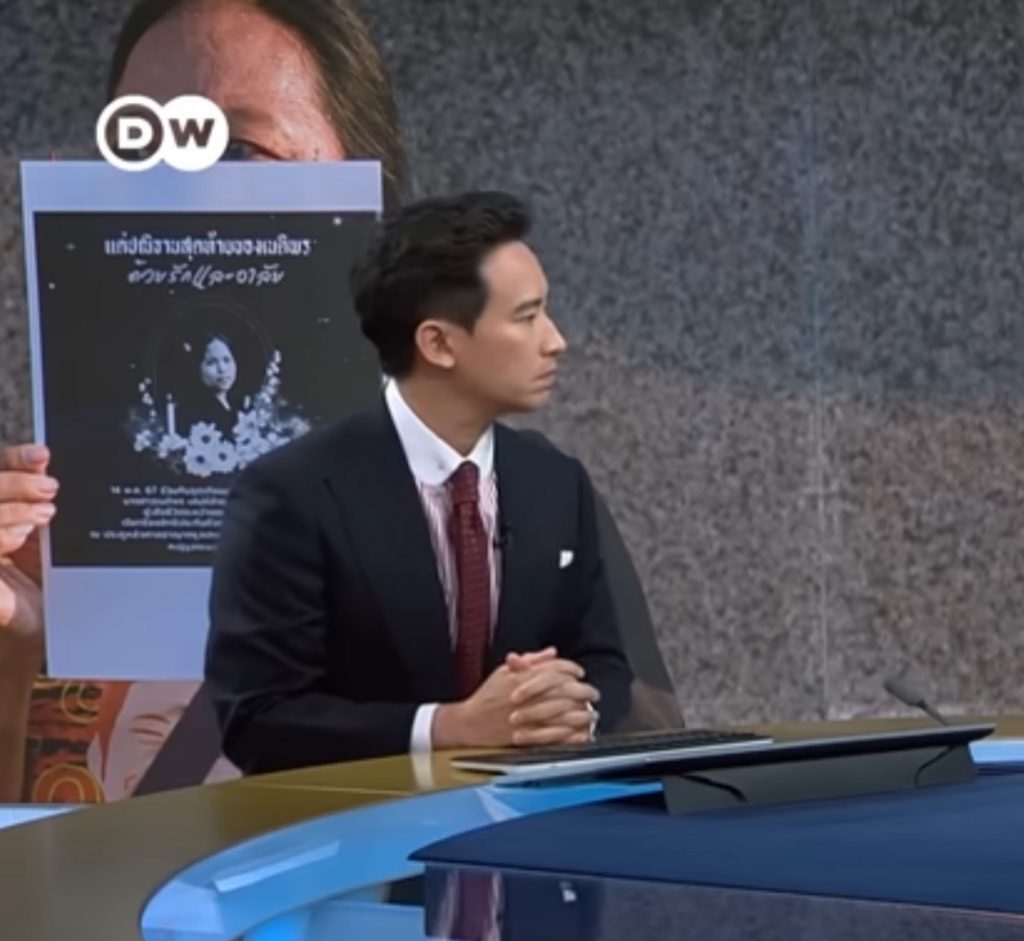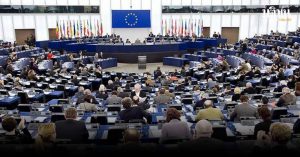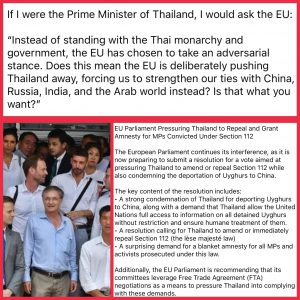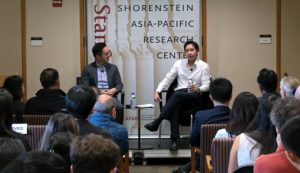
พิธาให้สัมภาษณ์สำนักข่าว DW ของเยอรมันเรื่องการตายของบุ้งว่า
นักเคลื่อนไหวหนุ่มสาวเรียกร้อง “หลักนิติธรรมแทนการใช้อำนาจตามกฎหมาย”
“It’s a tragic loss for Thailand as a nation, where a group of young activists was asking for the rule of law instead of rule by law.
มันเป็นความสูญเสียอันน่าเศร้าของประเทศไทยในฐานะชาติที่มีกลุ่มนักเคลื่อนไหวหนุ่มสาวซึ่งเรียกร้อง “หลักนิติธรรมแทนการใช้อำนาจตามกฎหมาย”
The rule of law กับ The rule by law
คืออะไรและแตกต่างกันอย่างไร?
Rule by Law คือ การใช้กฎหมายเป็นเครื่องมือของเผด็จการ เอาไว้บังคับคนอื่น ไม่บังคับกับพวกตัวเอง
Rule of Law คือ หลักนิติธรรมที่ทุกคนอยู่ภายใต้กฎหมายเดียวกัน
หลักนิติธรรม (The Rule of Law) และ การปกครองโดยกฎหมาย (Rule by Law)เป็นแนวคิดที่มีความแตกต่างกันอย่างชัดเจนในเรื่องของการปกครองและการใช้กฎหมาย:
1. หลักนิติธรรม (The Rule of Law)
– หลักการนี้หมายถึงการที่ทุกคน รวมถึงรัฐบาล ต้องปฏิบัติตามกฎหมาย กฎหมายต้องชัดเจน เป็นธรรม โปร่งใส และบังคับใช้เท่าเทียมกัน
– กฎหมายต้องคุ้มครองสิทธิมนุษยชนพื้นฐาน และบังคับใช้อย่างเป็นธรรมโดยผู้พิพากษาที่มีความเป็นกลางและมีความสามารถ
– ประเด็นสำคัญรวมถึงความเป็นธรรม ความเสมอภาคต่อหน้ากฎหมาย ความรับผิดชอบ และการคุ้มครองสิทธิมนุษยชน
– หลักนิติธรรมสะท้อนถึงหลักการเช่น ความมั่นคงทางกฎหมาย ความโปร่งใส และสิทธิในการพิจารณาคดีที่เป็นธรรม
2. การปกครองโดยกฎหมาย (Rule by Law)
– แนวคิดนี้หมายถึงการที่รัฐบาลใช้กฎหมายเป็นเครื่องมือในการควบคุมประชากรและรักษาอำนาจของตน กฎหมายอาจเป็นไปตามอำเภอใจ ไม่เป็นธรรม หรือบังคับใช้อย่างไม่เท่าเทียมกัน เพื่อรับใช้ประโยชน์ของผู้มีอำนาจมากกว่าที่จะคุ้มครองสิทธิของประชาชน
– กฎหมายอาจถูกใช้เพื่อความชอบธรรมในการกระทำของรัฐบาลโดยไม่ต้องคำนึงถึงความเป็นธรรมหรือความชอบธรรม
– การปกครองโดยกฎหมายอาจนำไปสู่การใช้อำนาจในทางที่ผิด โดยที่กฎหมายถูกบิดเบือนหรือบังคับใช้อย่างเลือกเฟ้นเพื่อกดขี่ผู้คัดค้านหรือฝ่ายตรงข้ามทางการเมือง
**สรุปความแตกต่าง**:
– หลักนิติธรรม (The Rule of Law) เน้นความยุติธรรม ความเสมอภาค และการคุ้มครองสิทธิของบุคคล โดยการบังคับใช้กฎหมายอย่างเป็นธรรมและชอบธรรมต่อทุกคน
-การปกครองโดยกฎหมาย (Rule by Law) เน้นการใช้กฎหมายเพื่อควบคุมและรักษาอำนาจ โดยอาจทำให้ความยุติธรรมและสิทธิของบุคคลถูกละเลย เพื่อรับใช้ประโยชน์ของผู้มีอำนาจ
อย่างไรก็ตาม รัฐบาลไทยปกครองประเทศภายใต้รัฐธรรมนูญที่เป็นไปตามหลักนิติธรรม ที่บัญญัติไว้ชัดเจนในเรื่องความยุติธรรม ความเสมอภาค และการคุ้มครองสิทธิของบุคคล โดยการบังคับใช้กฎหมายอย่างเป็นธรรมและชอบธรรมต่อทุกคน
พิธาอ้าง “กลุ่มนักเคลื่อนไหวหนุ่มสาวซึ่งเรียกร้องหลักนิติธรรมแทนการใช้อำนาจตามกฎหมาย”
พวกเขาเรียบร้องให้มีปฏิรูปกระบวนการยุติธรรม โดยอ้างว่าคนเห็นต่างทางการเมืองต้องไม่ถูกคุมขัง และได้รับสิทธิ์ประกันตัวนั้น
ทั้งที่ กลุ่มนักเคลื่อนไหวหนุ่มสาวต่างหากที่ไม่ปฏิบัติตามกฎหมาย การกระทำของคนกลุ่มนี้ ไม่ได้เป็นการแสดงความเห็นต่างทางการเมือง แต่เป็นการกระทำที่ไปดูหมิ่น หมิ่นประมาท อาฆาตมาดร้ายต่อสถาบันพระมหากษัตริย์ รวมทั้งการละเมิดสิทธิของผู้อื่น ซึ่งเป็นการทำผิดกฎหมาย
ในทุกประเทศทั่วโลก ไม่มีใครสามารถอ้างสิทธิส่วนบุคคล เพื่อไปดูหมิ่น หมิ่นประมาท อาฆาตมาดร้ายและละเมิดสิทธิของผู้อื่นได้ โดยเฉพาะอย่างยิ่ง การละเมิดกฎหมายคุ้มครองประมุขแห่งรัฐ
การที่พิธาเอาเรื่องนี้ไปให้สัมภาษณ์เพื่อบอกกับชาวโลกผ่านสื่อยักษ์ใหญ่ของเยอรมนี เป็นการแสดงว่าพิธาและพรรคก้าวไกล เป็นแนวร่วมกับบุ้งและพวก ในการตั้งใจละเมิดกฎหมาย “ด้วยมีเจตนาเซาะกร่อนบ่อนทำลายสถาบันพระมหากษัตริย์เป็นเหตให้ชำรุดทรุดโทรม เสื่อมทราม หรืออ่อนแอลง นำไปสู่การล้มล้างการปกครองระบอบประชาธิปไตยอันมีพระมหากษัตริย์ทรงเป็นประมุขในที่สุด” ตามที่ศาลรัฐธรรมนูญเคยวินิจฉัยนโยบายหาเสียงเลือกตั้งของพรรคก้าวไกล หรือไม่
………………………………………………………………………….
อัษฎางค์ ยมนาค
Pita told DW, the German news agency, that….
“It’s a tragic loss for Thailand as a nation, where a group of young activists was asking for the rule of law instead of rule by law.
“What is the difference between the Rule of Law and the Rule by Law?
Rule by Law refers to the use of laws as tools of authoritarian control, applied to oppress others while exempting those in power.
Rule of Law, on the other hand, is the principle that everyone, including those in power, is subject to the same laws, ensuring justice and equality under the law.”
“The rule of law” and “rule by law” are concepts that represent different approaches to governance and the application of laws.
1. The Rule of Law
– This principle means that everyone, including the government, is subject to the law. Laws are clear, publicized, stable, and just, and they are applied evenly. The rule of law ensures that laws protect fundamental rights and are enforced by competent and independent judges.
– Key aspects include fairness, equality before the law, accountability, and the protection of human rights.
– It embodies principles such as legal certainty, transparency, and the right to a fair trial.
2. Rule by Law
– In this concept, the government uses law as a tool to control the population and maintain its power. Laws may be arbitrary, unjust, or applied unevenly, serving the interests of those in power rather than protecting the rights of individuals.
– It often implies that the law is used to justify the actions of the government without ensuring that those actions are fair or just.
– Rule by law can lead to abuse of power, where laws are manipulated or selectively enforced to suppress dissent or political opposition.
**Summary of Differences**
– The Rule of Law: Focuses on justice, equality, and the protection of individual rights, ensuring that laws are applied fairly and justly to all.
– Rule by Law: Focuses on the use of law to control and maintain power, often at the expense of justice, fairness, and individual rights.
However, the Thai government governs the country under a constitution that adheres to the principles of the rule of law, clearly stipulating justice, equality, and the protection of individual rights through fair and just application of the law for everyone.
Pita claims that ‘a group of young activists is calling for the rule of law instead of rule by law.’
They are advocating for judicial reform, arguing that political dissenters should not be imprisoned and should have the right to bail.
In fact, it is the young activists who are not adhering to the law. Their actions are not merely expressions of political dissent, but rather acts of insulting, defaming, and threatening the monarchy, as well as violating the rights of others, which constitute legal offenses.
No country in the world allows individuals to claim personal rights to insult, defame, threaten, and violate the rights of others, especially when it involves breaking laws that protect the head of state.
By giving this interview to a major German media outlet, Pita demonstrates that he and the Move Forward Party align themselves with Bung and her group in deliberately violating the law. They appear to have the intent to undermine and erode the monarchy, ultimately aiming to overthrow the democratic system with the King as the head of state, as previously ruled by the Constitutional Court regarding the Move Forward Party’s election campaign policies.
Eddie Atsadang



